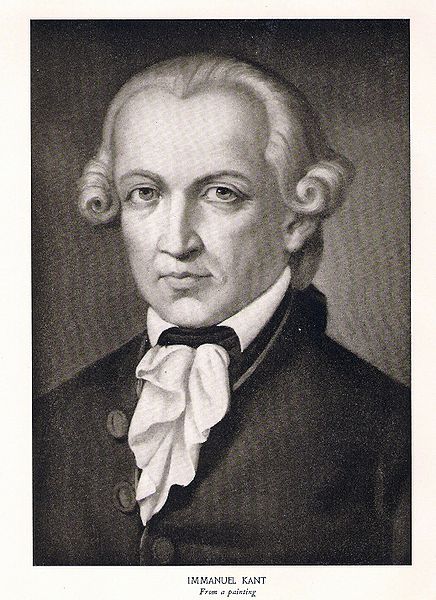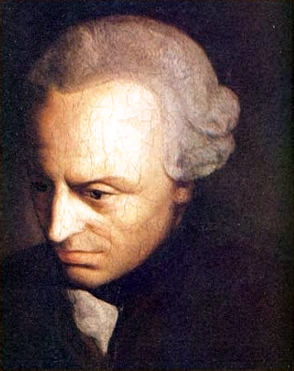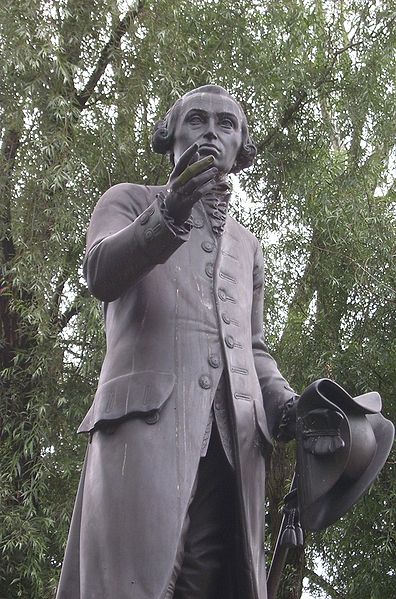<Back to Index>
- Philosopher Immanuel Kant, 1724
- Author Anne Louise Germaine de Staël-Holstein, 1766
- Queen of Castilla y León Isabella I, 1451



Immanuel Kant (22 April 1724 – 12 February 1804) was an 18th-century German philosopher from the Prussian city of Königsberg. Kant was the last influential philosopher of modern Europe in the classic sequence of the theory of knowledge during the Enlightenment beginning with thinkers John Locke, George Berkeley, and David Hume.
Kant created a new widespread perspective in philosophy which has continued to influence philosophy through to the 21st century. He published important works on epistemology, as well as works relevant to religion, law, and history. One of his most prominent works is the Critique of Pure Reason, an investigation into the limitations and structure of reason itself. It encompasses an attack on traditional metaphysics and epistemology, and highlights Kant's own contribution to these areas. The other main works of his maturity are the Critique of Practical Reason, which concentrates on ethics, and the Critique of Judgment, which investigates aesthetics and teleology.
Kant suggested that metaphysics can be reformed through epistemology. He suggested that by understanding the sources and limits of human knowledge we can ask fruitful metaphysical questions. He asked if an object can be known to have certain properties prior to the experience of that object. He concluded that all objects about which the mind can think must conform to its manner of thought. Therefore if the mind can think only in terms of causality – which he concluded that it does – then we can know prior to experiencing them that all objects we experience must either be a cause or an effect. However, it follows from this that it is possible that there are objects of such nature which the mind cannot think, and so the principle of causality, for instance, cannot be applied outside of experience: hence we cannot know, for example, whether the world always existed or if it had a cause. And so the grand questions of speculative metaphysics cannot be answered by the human mind, but the sciences are firmly grounded in laws of the mind.
Kant believed himself to be creating a compromise between the empiricists and the rationalists. The empiricists believed that knowledge is acquired through experience alone, but the rationalists maintained that such knowledge is open to Cartesian doubt and that reason alone provides us with knowledge. Kant argues, however, that using reason without applying it to experience will only lead to illusions, while experience will be purely subjective without first being subsumed under pure reason.
Kant’s thought was very influential in Germany during his lifetime, moving philosophy beyond the debate between the rationalists and empiricists. The philosophers Fichte, Schelling, Hegel and Schopenhauer each saw themselves as correcting and expanding the Kantian system, thus bringing about various forms of German idealism. Kant continues to be a major influence on philosophy, influencing both analytic and continental philosophy.
Immanuel Kant was born in 1724 in Königsberg, the capital of Prussia at that time, today the city of Kaliningrad in the Russian exclave of Kaliningrad Oblast. He was the fourth of eleven children (four of them reached adulthood). Baptized 'Emanuel', he changed his name to 'Immanuel' after learning Hebrew. In his entire life, he never traveled more than a hundred miles from Königsberg. His father, Johann Georg Kant (1682–1746), was a German harnessmaker from Memel, at the time Prussia's most northeastern city (now Klaipėda, Lithuania). His mother, Regina Dorothea Reuter (1697–1737), was born in Nuremberg. Kant's grandfather had emigrated from Scotland to East Prussia, and his father still spelled their family name "Cant." In his youth, Kant was a solid, albeit unspectacular, student. He was raised in a Pietist household that stressed intense religious devotion, personal humility, and a literal interpretation of the Bible.
Consequently, Kant received a stern education – strict, punitive,
and disciplinary – that preferred Latin and religious instruction
over mathematics and science. Kant showed a great aptitude to study at an early age. He was first sent to Collegium Fredericianum and then enrolled at theUniversity of Königsberg (where he would spend his entire career) in 1740, at the age of 16. He studied the philosophy of Leibniz and Wolff under Martin Knutzen, a rationalist who
was also familiar with developments in British philosophy and science
and who introduced Kant to the new mathematical physics of Newton. Knutzen dissuaded Kant from the theory of pre-established harmony, which he regarded as "the pillow for the lazy mind". He also dissuaded the young scholar from idealism, which was negatively regarded by most philosophers in the 18th century (The theory of transcendental idealism that
Kant developed in the "Critique of Pure Reason" is not traditional
idealism, i.e. the idea that reality is purely mental. In fact, Kant
produced arguments against traditional idealism in the second part of
the "Critique of Pure Reason"). His father's stroke and subsequent
death in 1746 interrupted his studies. Kant became a private tutor in
the smaller towns surrounding Königsberg, but continued his
scholarly research. 1749 saw the publication of his first philosophical
work, Thoughts on the True Estimation of Living Forces. Kant is best known for his transcendental idealist philosophy that time and space are not materially real but merely the ideal a priori condition
of our internal intuition. Also, he made an important astronomical
discovery, namely the discovery of the retardation of the rotation of
the Earth, for which he won the Berlin Academy Prize in 1754. Even more
importantly, from this Kant concluded that time is not a thing in
itself determined from experience, objects, motion, and change, but
rather an unavoidable framework of the human mind that preconditions
possible experience. He became a university lecturer in 1755. The subject on which he lectured was "Metaphysics"; the course textbook was written by A.G. Baumgarten. In the General History of Nature and Theory of the Heavens (Allgemeine Naturgeschichte und Theorie des Himmels) (1755), Kant laid out the Nebular hypothesis,
in which he deduced that the Solar System formed from a large cloud of
gas, a nebula. He thus attempted to explain the order of the solar
system, seen previously by Newton as being imposed from the beginning by God. Kant also correctly deduced that the Milky Way was
a large disk of stars, which he theorized also formed from a (much
larger) spinning cloud of gas. He further suggested the possibility
that other nebulae might also be similarly large and distant disks of
stars. These postulations opened new horizons for astronomy: for the
first time extending astronomy beyond the solar system to galactic and
extragalactic realms. From
this point on, Kant turned increasingly to philosophical issues,
although he continued to write on the sciences throughout his life. In
the early 1760s, Kant produced a series of important works in
philosophy. The False Subtlety of the Four Syllogistic Figures, a work in logic, was published in 1762. Two more works appeared the following year: Attempt to Introduce the Concept of Negative Magnitudes into Philosophy and The Only Possible Argument in Support of a Demonstration of the Existence of God. In 1764, Kant wrote Observations on the Feeling of the Beautiful and Sublime and then was second to Moses Mendelssohn in a Berlin Academy prize competition with his Inquiry Concerning the Distinctness of the Principles of Natural Theology and Morality (often
referred to as "the Prize Essay"). In 1770, at the age of 45, Kant was
finally appointed Professor of Logic and Metaphysics at the University
of Königsberg. Kant wrote his Inaugural Dissertation in
defence of this appointment. This work saw the emergence of several
central themes of his mature work, including the distinction between
the faculties of intellectual thought and sensible receptivity. Not to
observe this distinction would mean to commit the error of subreption, and, as he says in the last chapter of the dissertation, only in avoidance of this error will metaphysics flourish. The
issue that vexed Kant was central to what twentieth century scholars
termed "the philosophy of mind." The flowering of the natural sciences
had led to an understanding of how data reaches the brain. Sunlight may
fall upon a distant object, whereupon light is reflected from various
parts of the object in a way that maps the surface features (color,
texture, etc.) of the object. The light reaches the eye of a human
observer, passes through the cornea, is focused by the lens upon the
retina where it forms an image similar to that formed by light passing
through a pinhole into a camera obscura. The retinal cells next send impulses through the optic nerve and
thereafter they form a mapping in the brain of the visual features of
the distant object. The interior mapping is not the exterior thing
being mapped, and our belief that there is a meaningful relationship
between the exterior object and the mapping in the brain depends on a
chain of reasoning that is not fully grounded. But the uncertainty
aroused by these considerations, the uncertainties raised by optical
illusions, misperceptions, delusions, etc., are not the end of the
problems. Kant
saw the mind could not function as an empty container that simply
receives data from the outside. Something had to be giving order to the
incoming data. Images of external objects have to be kept in the same
sequence in which they were received. This ordering occurs through the
mind's intuition of time. The same considerations apply to the mind's
function of constituting space for ordering mappings of visual and tactile signals arriving via the already described chains of physical causation.
At
the age of 46, Kant was an established scholar and an increasingly
influential philosopher. Much was expected of him. In response to a
letter from his student, Markus Herz, Kant came to recognize that in the Inaugural Dissertation,
he had failed to account for the relation and connection between our
sensible and intellectual faculties, i.e., he needed to explain both
how humans acquire data and how they process data—related but very
different processes. He also credited David Hume with awakening him from "dogmatic slumber" (circa 1770). Kant did not publish any work in philosophy for the next eleven years. Kant
spent his silent decade working on a solution to the problem mentioned
above. Although fond of company and conversation with others, Kant
isolated himself. He resisted friends' attempts to bring him out of his
isolation. In 1778, in response to one of these offers by a former
pupil, Kant wrote "Any change makes me apprehensive, even if it offers
the greatest promise of improving my condition, and I am persuaded by
this natural instinct of mine that I must take heed if I wish that the
threads which the Fates spin so thin and weak in my case to be spun to
any length. My great thanks, to my well-wishers and friends, who think
so kindly of me as to undertake my welfare, but at the same time a most
humble request to protect me in my current condition from any
disturbance." When Kant emerged from his silence in 1781, the result was the Critique of Pure Reason. Although now uniformly recognized as one of the greatest works in the history of philosophy, this Critique was
largely ignored upon its initial publication. The book was long, over
800 pages in the original German edition, and written in what some
considered a convoluted style. It received few reviews, and these
granted no significance to the work. Its density made it, as Johann Gottfried Herder put it in a letter to Johann Georg Hamann, a "tough nut to crack," obscured by "…all this heavy gossamer." Its
reception stood in stark contrast to the praise Kant had received for
earlier works such as his "Prize Essay" and other shorter works that
precede the first Critique. These well-received and readable tracts include one on the earthquake in Lisbon which was so popular that it was sold by the page. Prior to the change in course documented in the first Critique, his books sold well, and by the time he published Observations On the Feeling of the Beautiful and the Sublime in 1764 he had become a popular author of some note. Kant was disappointed with the first Critique's reception. Recognizing the need to clarify the original treatise, Kant wrote the Prolegomena to any Future Metaphysics in 1783 as a summary of its main views. He also encouraged his friend, Johann Schultz, to publish a brief commentary on the Critique of Pure Reason. Kant's reputation gradually rose through the 1780s, sparked by a series of important works: the 1784 essay, "Answer to the Question: What is Enlightenment?"; 1785s Groundwork of the Metaphysics of Morals (his first work on moral philosophy); and, from 1786, Metaphysical Foundations of Natural Science. But Kant's fame ultimately arrived from an unexpected source. In 1786, Karl Reinhold began
to publish a series of public letters on the Kantian philosophy. In
these letters, Reinhold framed Kant's philosophy as a response to the
central intellectual controversy of the era: the Pantheism Dispute. Friedrich Jacobi had accused the recently deceased G. E. Lessing (a distinguished dramatist and philosophical essayist) of Spinozism. Such a charge, tantamount to atheism, was vigorously denied by Lessing's friend Moses Mendelssohn,
and a bitter public dispute arose among partisans. The controversy
gradually escalated into a general debate over the values of the
Enlightenment and the value of reason itself. Reinhold maintained in
his letters that Kant's Critique of Pure Reason could
settle this dispute by defending the authority and bounds of reason.
Reinhold's letters were widely read and made Kant the most famous
philosopher of his era. Kant published a second edition of the Critique of Pure Reason (Kritik
der reinen Vernunft) in 1787, heavily revising the first parts of the
book. Most of his subsequent work focused on other areas of philosophy.
He continued to develop his moral philosophy, notably in 1788's Critique of Practical Reason (known as the second Critique) and 1797’s Metaphysics of Morals. The 1790 Critique of Judgment (the third Critique) applied the Kantian system to aesthetics and teleology.
He also wrote a number of semi-popular essays on history, religion,
politics and other topics. These works were well received by Kant's
contemporaries and confirmed his preeminent status in eighteenth
century philosophy. There were several journals devoted solely to
defending and criticizing the Kantian philosophy. But despite his
success, philosophical trends were moving in another direction. Many of
Kant's most important disciples (including Reinhold, Beck and Fichte)
transformed the Kantian position into increasingly radical forms of
idealism. The progressive stages of revision of Kant's teachings marked
the emergence of German Idealism. Kant opposed these developments and publicly denounced Fichte in an open letter in 1799. It
was one of his final acts expounding a stance on philosophical
questions. In 1800, a student of Kant, named Gottlob Benjamin
Jäsche, published a manual of logic for teachers called Logik, which he had prepared at the request of Kant. Jäsche prepared the Logik using a copy of a text book in logic by Georg Freidrich Meier entitled Auszug aus der Vernunftlehre, in which Kant had written copious notes and annotations. The Logik has
been considered to be of fundamental importance to Kant's philosophy,
and the understanding of it. For, the great nineteenth century logician Charles Sanders Peirce remarked, in an incomplete review of Thomas Kingsmill Abbott's English translation of the introduction to the Logik, that "Kant's whole philosophy turns upon his logic." Also, Robert Schirokauer Hartman and Wolfgang Schwarz, wrote in the translators' introduction to their English translation of the Logik, "Its importance lies not only in its significance for the Critique of Pure Reason, the second part of which is a restatement of fundamental tenets of the Logic, but in its position within the whole of Kant's work." Kant's
health, long poor, took a turn for the worse and he died at
Königsberg on 12 February 1804 uttering "Genug" [enough] before
expiring. His unfinished final work, the fragmentary Opus Postumum, was (as its title suggests) published posthumously. Kant
never concluded that one could form a coherent account of the universe
and of human experience without grounding such an account in the "thing in itself."
Many of those who followed him argued that since the "thing in itself"
was unknowable its existence could not simply be assumed. Rather than
arbitrarily switching to an account that was ungrounded in anything
supposed to be the "real," as did the German Idealists, another group
arose to ask how our (generally reliable) accounts of a coherent and
rule-abiding universe were actually grounded. This new kind of
philosophy became known as Phenomenology, and its preeminent spokesman was Edmund Husserl.